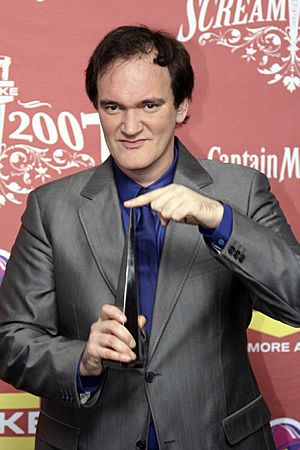Cinephilia facts for kids

Have you ever loved movies so much that you wanted to learn everything about them? That strong interest in films, movie ideas, and how movies are made is called cinephilia. People who feel this way are called cinephiles or simply movie buffs.
Cinephilia has been around since the early days of movies, even during the silent film era. Over time, different groups of people have shown a huge interest in cinema.
Contents
What is Cinephilia?
Cinephilia is a deep passion for movies. It means you love watching films, thinking about them, and discussing them. A cinephile enjoys exploring different types of movies, learning about directors, and understanding how films tell stories.
Where Did Cinephilia Start?
One of the most famous groups of cinephiles grew in Paris, France, during World War II. At this time, many foreign movies came into France. Local movie clubs also showed special films. This made young, smart people in Paris very interested in movies from all over the world.
This group of movie lovers helped discover and appreciate many directors and films that might have been forgotten or unknown in Western countries. They really helped shine a light on amazing cinema.
Famous Directors Loved by Cinephiles
Some of the directors that French cinephiles especially admired during this time include Alfred Hitchcock and Orson Welles. These directors made movies that were new and exciting, and cinephiles loved to study their work.
The Meaning of the Word
The word "cinephilia" comes from two parts: "cinema" (which means movies) and "philia" (which is an ancient Greek word for love). So, "cinephilia" literally means "love of cinema."
How Technology Changed Cinephilia
For a long time, being a cinephile often meant going to movie theaters a lot. But as technology changed, so did cinephilia. When VHS tapes and later DVDs became popular, people could watch movies at home more easily. This meant that cinephilia became less about just going to the cinema and more about collecting and watching films at home.
Global Love for Movies
In the middle of the 20th century, Japanese films became very popular around the world. Later, in the late 20th century, cinephiles started to show a lot of interest in movies from other Asian countries. This included films from China, Hong Kong, Taiwan, and later, Thailand. This showed how the love for movies can spread across different cultures and countries.
Images for kids
-
The Italian director Federico Fellini became very popular in the United States in the 1960s and 1970s. This was partly because film critics supported him and more foreign films were shown to a public that wanted more complex movies.
-
Wong Kar-wai (pictured) is a well-known arthouse film director from Hong Kong. He is famous for movies like Chungking Express (1994) and In the Mood for Love (2000).
-
American director and cinephile Quentin Tarantino often makes references in his work to movies and directors he admires.
See also
 In Spanish: Cinefilia para niños
In Spanish: Cinefilia para niños
 | Charles R. Drew |
 | Benjamin Banneker |
 | Jane C. Wright |
 | Roger Arliner Young |




